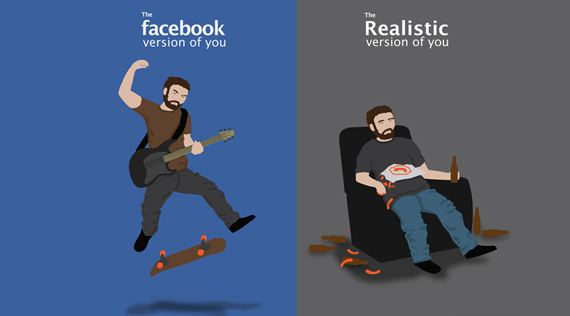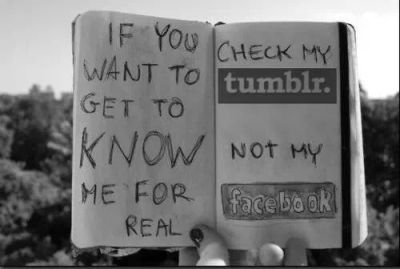Title Goes Here (Identity, Necroblogging, Share Cropping)
I’ve wanted to write this post for a while, and I’ve struggled because it’s really three topics that are intertwined in my head:
- Identity on the Internet is prismatic1, Facebook is failing to deal with that and we’re slowly cycling back to a decentralised and pseudononymous Internet.
- Blogging isn’t dead: Tumblr and Twitter are not some separate species.
- “The Web of Yore” barely existed for most of the real world. We have always been digital share croppers and if you don’t believe me, you should ask Archive Team
Identity
Mark Zuckerberg is on record as saying “Having two identities for yourself is an example of a lack of integrity.”. That pretty much clarifies where Facebook comes down on the issue of identity. Google Plus follows suit closely, as anyone who has ever been asked if they want to use their real name on YouTube can attest.
Google get lots of heat over this because while technology-types are happy to assume that Facebook will be evil, once upon a time Google were pretty proud of doing the right thing. And that right thing was mainly swayed by what their own, smart people thought.
(One of their own, smart people happens to be Skud, uncommonly known as Kirrily Robert, who has her own strong thoughts on identity and got involved in a highly ironic dispute with Google about using her common name (Skud) on Plus, just like she did on her employee badge)
I’m a fan of Twitter (also ADN, just sayin’) and I used to be fond of the phrase “Facebook is for people you’re friends with, Twitter is for people you want to be friends with”.
It turns out I wasn’t very original:
— lexisb
Trying to attach everything to one version of who you are is what is fundamentally bad about Facebook. It’s what’s bad about Plus. I’m not alone in thinking this2. It’s why Facebook offered Snapchat $3B, and it’s why Snapchat turned them down. It’s why Kik has 100 million users but most people haven’t even heard of it.
Users can create identies on Tumblr, Twitter, Kik, use them with one group of friends, or throw them away. Users of Snapchat can use the service for more than sexting3, knowing that whatever they do on there isn’t forming part of some permanent record.
People have more than one identity they present to the outside world:
I for one could not be happier that the IRC logs from my teenage years are not available online. At least, not with my identity attached to them.
Out of tens of thousands of Internet users in Ireland in those pioneering days I ended up in a ~200 person IRC group with someone I happened to go to school with. Neither of us knew this until I went to a meet in St. Stephen’s Green.
That seems perfectly reasonable to me. I’m certain that the person that I was becoming — separate from school and family — would have been curtailed if I actually knew that I knew someone on IRC in “real life”.
(The pictures of that meet are still up!) (13 years!)

Given that I met my wife online, in an initially pseudononymous environment, I think it’s reasonable to see why I have strong views about this stuff.
I’m not really the person I was on IRC. I’m quite like that person on Twitter: a more sarcastic, excitable and condescending version of myself.
If the number of people who recognised @knittage is anything to go by, PVRs did not kill the advert star
— Aaron Brady (@insom) November 13, 2013
When I was on Facebook, I immediately started to feel like I was back at school.
Everyone wants to make themselves look better on Facebook, it’s natural, especially when the people you have on there are distant-not-quite-friends — people you knew from school or college or previous jobs, but who weren’t important enough to keep in touch with in any meaningful way, so you just like their Candy Crush updates.

I have two Google accounts, because the personalisation that Google more-or-less forces on you is inappropriate. Do I want video suggestions from my personal browsing popping up while I use YouTube for work purposes? (There are work purposes). No.
I also pretty much need to have a Plus page for work purposes (SEO, etc) – but do I want prospective or current customers seeing that nudge-nudge reference to pornography I posted on Tumblr or fan-art about an unrequited gay love affair between two fictional characters?
Do I want to be bombarded with Magento development news when I’m killing time on the Internet at 2AM? Also: no.
People need pseudonyms to explore parts of who they are. Vent about things in their life. Discuss their addiction problems or self harm with a group of people that won’t judge them and a way that doesn’t bleed into their “real life”4.
Necroblogging
Jason Kottke wrote a piece for Nieman Journalism Lab called “The blog is dead, long live the blog“.
He acknowledges in the piece that lots of blogginess has influenced most things that have come afterwards, but still goes on to call blogging dead- in the sense that very few people starting out today on Twitter or Tumblr would consider what they are doing to be blogging.
The other two legs of the argument are that referrals from blogs are way down compared to “social media”5 and that the chronological list view, as pioneered by the weblog, is dying out in favour of algorithms picking the most popular things on Facebook; and Pinterest and Digg (Digg!) using a grid.
Those things are fine and arguably true, but I think it takes a 1997-2000 mindset to think that blogging (putting things on the Internet, more or less organised by date) is inexorably tied up with this other stuff (RSS readers, list views, hosting your own web site).
Tumblr is a blogging platform. End of. Lots of people just reblog (note the verb) cat pictures and pornography, but a massive amount of people are keeping their diaries online, just like with blogging, just like with LiveJournal.
Oooh ooh ooh. For the triple: that brings me on to my last part!
Share Cropping
You might think it’s bad, or you might think it’s good, but the majority of people interacting with the web in 2013 are using a tiny proportion of the Internet. It doesn’t matter what order you think things are in, you instinctively know the list: Wikipedia, Tumblr, Google, Facebook, Instagram, YouTube, Amazon. (I vaguely checked these against Alexa Top Sites to make sure I wasn’t totally making this up).
People are creating content locked into walled gardens, and then those walled gardens’ commercial interests are coming along and much of that content is threatened or lost.
That’s bad. I don’t think that’s controversial. But it’s not new. Nerds have long run their own private WordPresses on their own domains and scoffed when Posterous shut its doors. (Disclaimer: I’m a nerd and I run my own blog software on my own domain)
Looking at the downsides of this really misses the point, the positive thing that we should take away from this, because it’s been happening since Geocities in the 90’s: even though companies take the stuff you make, put their name on it, sell adverts next to it and maybe even delete the stuff on short notice — they give regular people a place to create things on the Internet, without the colossal investment in time required to even set up a basic WordPress.
Tumblr is 100% the next Geocities. It’s entirely down to point of view if you think that’s good or bad.
-
Tip of the hat to moot for this term: it’s perfect, and he talked about it at O’Reilly’s 2011 Web 2.0 Summit ↩
-
That last one was another Xoogler, for bonus points. ↩
-
Allegedly, I guess? ↩
-
The three men met up via an internet chatroom, way before meeting in person, or “IRL” (In Real Life) as the court judges call it and “AFK” (Away From Keyboard) as Peter Sunde calls it. Sunde believed that “the internet is for real” and that going out and actually meeting someone was being away from the internet rather than in real life.
-
Which apparently doesn’t include blogs any more. Social media owned by large corporations maybe? ↩

